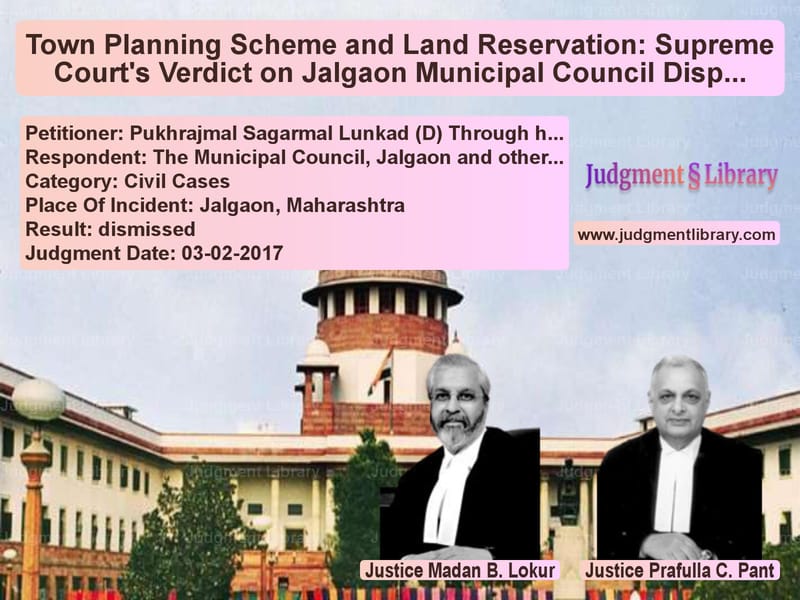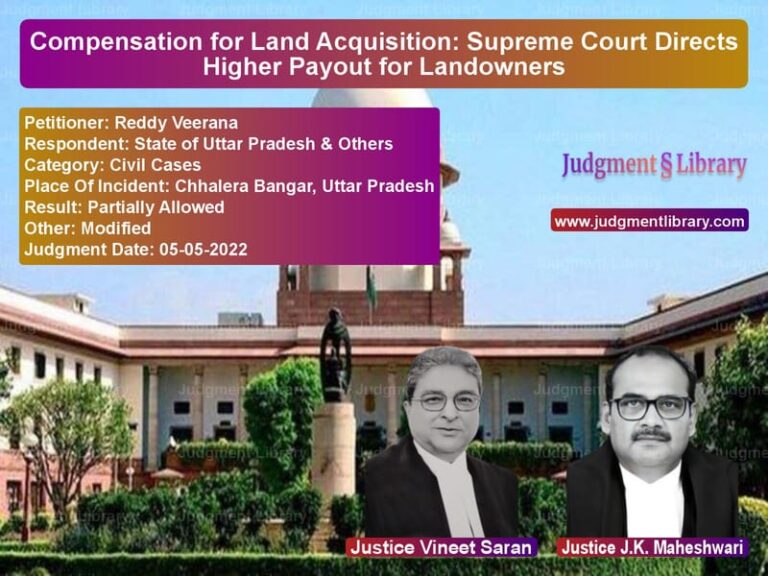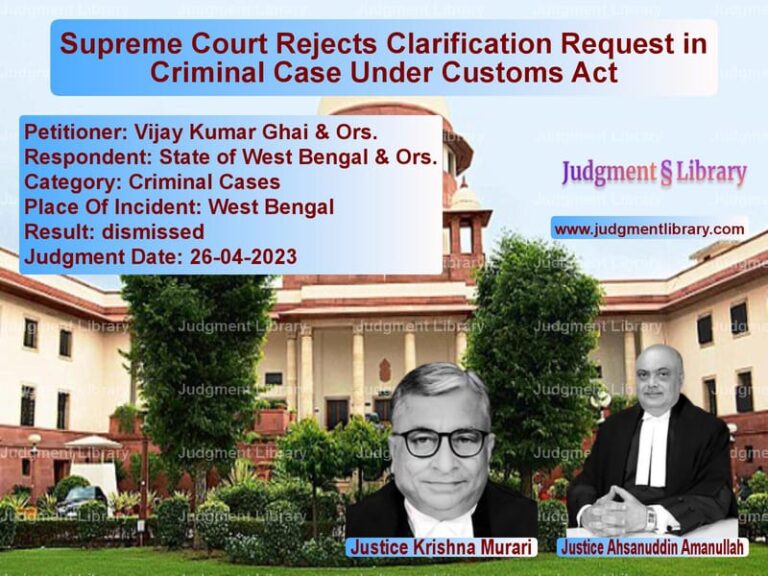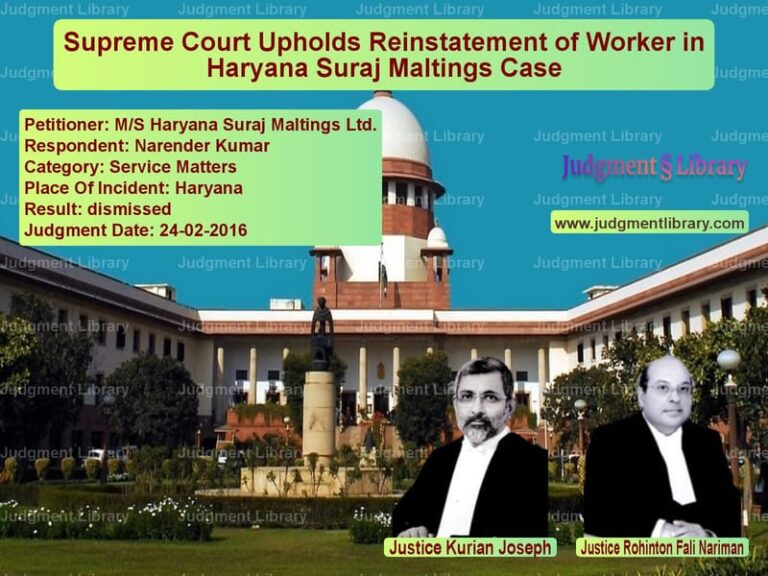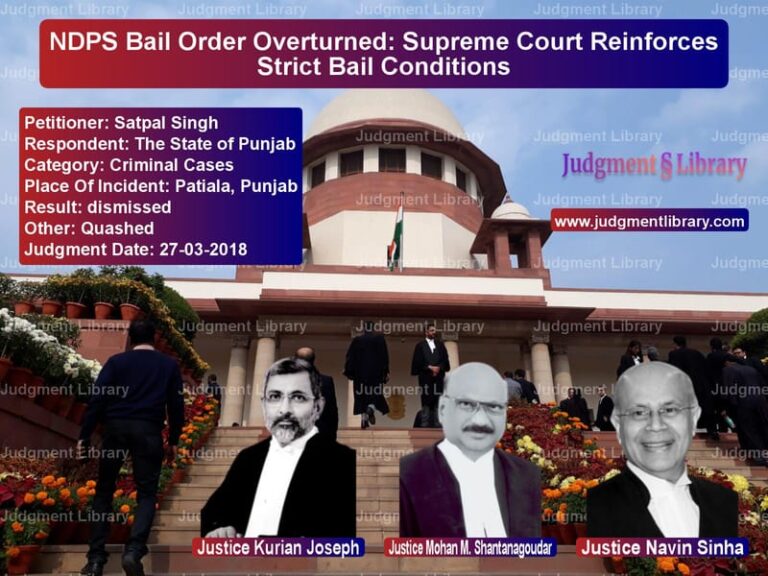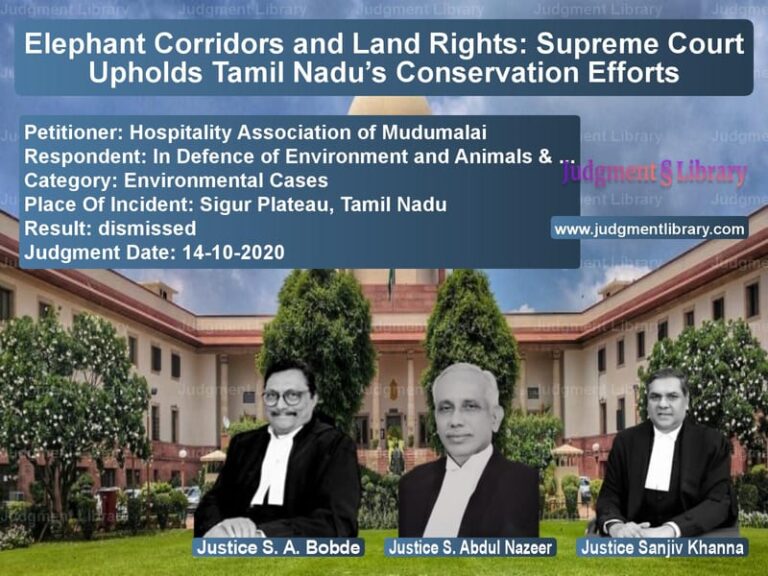Town Planning Scheme and Land Reservation: Supreme Court’s Verdict on Jalgaon Municipal Council Dispute
The Supreme Court of India, in its judgment dated February 3, 2017, ruled on a crucial land reservation and town planning dispute in the case of Pukhrajmal Sagarmal Lunkad (D) Through his L.Rs. and others vs. The Municipal Council, Jalgaon and others. This judgment sheds light on the interpretation of land acquisition laws under the Maharashtra Regional and Town Planning Act, 1966 (MRTP Act) and the legal process governing Town Planning Schemes. The case primarily revolved around whether the reservation of certain lands for public use had lapsed due to inaction by the municipal authorities, and whether Section 127 of the MRTP Act applied in such a scenario.
The dispute arose over the Jalgaon Municipal Council’s failure to acquire lands that had been reserved for public purposes, such as the construction of a garden, library, maternity home, and dispensary. The petitioners, who were the rightful owners of the land, claimed that the reservation should lapse due to the failure of the authorities to complete the acquisition within the statutory period. However, the respondents argued that the land was included in a Town Planning Scheme, which followed a distinct process for land acquisition.
Background of the Case
The appellants were the owners of Survey No. 431/A-1, A-2, A-3, and 431/B situated in Mehrun, Jalgaon. The dispute dates back to 1971, when the Jalgaon Municipal Council, acting as the Planning Authority, published a Draft Development Plan that included these lands under a reservation scheme. The final version of this plan was approved in 1974. The appellants contended that the reservation of their land had lapsed under the provisions of Section 127 of the MRTP Act, as ten years had elapsed without any acquisition steps being taken.
Key Legal Provisions Involved
Section 126 of the MRTP Act
This section outlines the process for acquiring reserved land through either:
- Agreement between the landowner and the Planning Authority.
- Application to the State Government for compulsory acquisition under the Land Acquisition Act, 1894.
Section 127 of the MRTP Act
This provision allows a landowner to serve notice on the Planning Authority if land reserved for public purposes is not acquired within ten years. If no acquisition steps are taken within six months of such notice, the reservation is deemed to have lapsed.
Arguments by the Petitioners
The appellants claimed:
- The Final Development Plan came into effect on December 16, 1974, making December 16, 1984 the deadline for acquisition.
- A notice under Section 127 was served to the Municipal Council on October 7, 1986, yet no acquisition steps were taken within six months.
- Despite repeated representations, the Planning Authority did not release the land, prompting them to file writ petitions.
Arguments by the Respondents
The Municipal Council refuted these claims, arguing:
- The land was part of Town Planning Scheme III from September 9, 1976, making Sections 126 and 127 inapplicable.
- An Arbitrator determined compensation for the land in 1980, and possession was voluntarily handed over in 1981.
- The State Government approved the final Town Planning Scheme in 1993, which reaffirmed the reservation.
Supreme Court’s Observations
The Supreme Court analyzed whether the land reservation had truly lapsed and whether Section 127 applied to lands included in a Town Planning Scheme. The Court concluded:
- The distinction between Development Plans and Town Planning Schemes is crucial, as the latter involves a comprehensive land pooling process.
- Section 127 does not apply to lands under Town Planning Schemes, making the appellants’ reliance on this section untenable.
- The compensation had been determined and deposited, signifying due process under the MRTP Act.
- The decision in Girnar Traders vs. State of Maharashtra was not applicable, as that case pertained to a Development Plan.
Conclusion and Verdict
The Supreme Court upheld the Bombay High Court’s decision, ruling that:
- The land reservation had not lapsed.
- The Town Planning Scheme followed proper legal procedures.
- The petitioners’ appeal was dismissed.
This ruling clarifies that landowners cannot claim lapsing of reservation under Section 127 if the land is part of a Town Planning Scheme, as the latter has its own legal process.
Don’t miss out on the full details! Download the complete judgment in PDF format below and gain valuable insights instantly!
Download Judgment: Pukhrajmal Sagarmal vs The Municipal Counci Supreme Court of India Judgment Dated 03-02-2017.pdf
Direct Downlaod Judgment: Direct downlaod this Judgment
See all petitions in Property Disputes
See all petitions in Landlord-Tenant Disputes
See all petitions in Damages and Compensation
See all petitions in Judgment by Madan B. Lokur
See all petitions in Judgment by Prafulla C. Pant
See all petitions in dismissed
See all petitions in supreme court of India judgments February 2017
See all petitions in 2017 judgments
See all posts in Civil Cases Category
See all allowed petitions in Civil Cases Category
See all Dismissed petitions in Civil Cases Category
See all partially allowed petitions in Civil Cases Category

